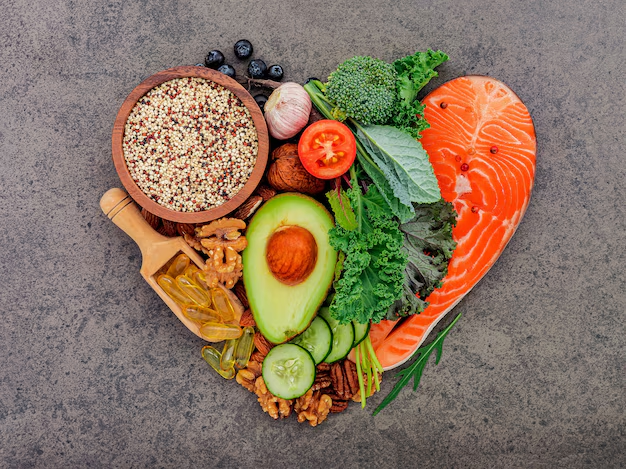Losing weight is more than just changing your appearance—it’s about becoming a healthier, more energized, and confident version of yourself. In a world full of fad diets and unrealistic body ideals, it’s easy to fall into quick-fix traps that promise fast results but often sacrifice your long-term well-being.
The truth is, healthy weight loss isn’t about deprivation or punishment. It’s about balance, consistency, and self-care. Lasting transformation happens when you focus on sustainable habits that nourish both body and mind—without the stress, guilt, or burnout.
Whether you’re beginning your journey or seeking smarter strategies to maintain progress, this guide offers a practical, supportive approach to losing weight safely. You’ll discover 8 essential tips designed to help you stay healthy while achieving your goals—so you can build a lifestyle that feels good and works long-term.
Let’s get started on the path to a stronger, healthier you.
1. Focus on Nutrition, Not Deprivation

Many people think the fastest way to lose weight is by skipping meals or drastically slashing calories. While it’s true that burning more calories than you consume leads to weight loss, starving your body can actually backfire and slow your progress.
When you don’t fuel your body properly, it can trigger fatigue, mood swings, and even nutrient deficiencies. Your metabolism may slow down, and your body could start storing fat instead of burning it—making it harder to lose weight over time. Extreme restriction can also lead to binge-eating and unhealthy habits that are tough to break.
The smarter way to lose weight is through balanced nutrition and consistency. Focus on whole foods, reasonable portions, and regular meals that keep you energized and satisfied. Losing weight doesn’t mean punishing yourself—it means creating habits that nourish your body and support long-term wellness.
Instead, prioritize: (Lose Weight)
- Whole foods: Fill your plate with fruits, vegetables, whole grains, lean proteins, and healthy fats.
- Balanced meals: Include protein, fiber, and healthy fats in every meal to keep you full longer.
- Portion control: Eating the right portion sizes can help you reduce intake without feeling deprived.
- Mindful eating: Pay attention to your hunger cues, eat slowly, and savor your food.
Pro Tip: Keep a food journal or use a nutrition tracking app to become more aware of your eating patterns.
2. Make Physical Activity a Daily Habit
Exercise is more than just a weight loss tool—it’s a powerful way to elevate your overall health. While burning calories helps you lose weight, the real benefits go far beyond the scale. Regular physical activity boosts your mood, enhances mental clarity, and improves sleep, all of which support long-term wellness.
The key to staying consistent is finding activities you genuinely enjoy. Whether it’s dancing, swimming, cycling, walking, or a group fitness class, enjoyable movement turns working out from a dreaded task into something you look forward to. When it’s fun, you’re more likely to stick with it.
Remember, exercise doesn’t have to be intense to be effective. Even 30 minutes of moderate movement a day can help you lose weight and improve your health. Make it part of your lifestyle—not a temporary fix—and you’ll see lasting results both physically and mentally.
Recommended routine: (Lose Weight)
- Cardiovascular exercise (e.g., walking, running, cycling): Aim for at least 150 minutes a week.
- Strength training (e.g., lifting weights, bodyweight exercises): 2-3 times per week to build muscle and increase metabolism.
- Flexibility and balance (e.g., yoga, Pilates): Helps reduce injury and improves overall body function.
Pro Tip: Start with small, achievable goals like a 10-minute walk after meals and gradually increase intensity and duration.
3. Hydrate Your Way to Health (Lose Weight)

Water is often underestimated in the weight loss journey. Staying well-hydrated not only supports digestion and metabolism but also helps reduce cravings. Sometimes, your body confuses thirst for hunger.
How much water should you drink? (Lose Weight)
A general rule is to aim for 8–10 cups (2–2.5 liters) a day, but this can vary based on your body size, activity level, and environment.
Tips for staying hydrated: (Lose Weight)
- Start your day with a glass of water.
- Carry a reusable water bottle with you.
- Infuse your water with fruits, herbs, or cucumber for flavor.
Pro Tip: Drink a glass of water 20–30 minutes before meals to help control appetite.
4. Prioritize Sleep and Stress Management
When it comes to weight loss, sleep and stress often get overlooked — yet both have a direct impact on hormones that regulate hunger and fat storage.
Sleep: (Lose Weight)
Lack of sleep disrupts hormones like ghrelin (increases hunger) and leptin (signals fullness). Aim for 7–9 hours of quality sleep each night.
Stress: (Lose Weight)
Chronic stress increases cortisol levels, which can lead to weight gain, especially around the belly. Managing stress is essential for hormonal balance and emotional well-being.
Tips to improve sleep and reduce stress:
- Stick to a consistent sleep schedule.
- Avoid screens and caffeine before bedtime.
- Practice meditation, deep breathing, or journaling. (Lose Weight)
- Spend time in nature or engage in hobbies.
Pro Tip: Establish a calming bedtime routine to wind down your mind and body for better sleep.
5. Don’t Skip Breakfast (Or Any Meal)

Skipping meals—especially breakfast—might feel like a quick way to cut calories, but it often leads to more harm than good. When you deprive your body of its morning fuel, your metabolism slows down, and your energy levels dip, making it harder to stay active and focused throughout the day.
Hunger tends to build up after missed meals, leading to intense cravings later. This often results in overeating during lunch or dinner or reaching for sugary, processed snacks to curb your hunger quickly. These impulsive food choices can derail your weight loss goals and affect your overall health.
Instead of skipping meals, focus on eating balanced, portion-controlled meals at regular intervals. A protein-rich breakfast paired with fiber and healthy fats can kickstart your metabolism and keep you satisfied for hours. Consistency is key—nourishing your body regularly helps manage hunger, reduces cravings, and supports sustainable weight loss.
Benefits of a healthy breakfast: (Lose Weight)
- Jumpstarts your metabolism.
- Improves focus and energy.
- Reduces the likelihood of binge eating later.
Examples of nutritious breakfasts: (Lose Weight)
- Oatmeal topped with berries and almonds.
- Greek yogurt with chia seeds and honey.
- Whole-grain toast with avocado and poached egg.
Pro Tip: Prepare your breakfast the night before if you’re short on time in the mornings.
6. Be Consistent, Not Perfect
One of the biggest mindset traps people face when trying to lose weight is the belief that they must be perfect to succeed. This “all or nothing” thinking—where one missed workout or indulgent meal feels like total failure—can quickly lead to frustration and burnout. But real, lasting weight loss isn’t about being flawless; it’s about being consistent.
The truth is, one unhealthy choice won’t undo all your progress—just like one healthy choice doesn’t magically result in weight loss. What matters most is the overall pattern of your habits. If you’re eating well and staying active most of the time, occasional slip-ups are part of a normal, balanced life.
Instead of punishing yourself or giving up after a setback, treat it as a learning moment. Reset, refocus, and keep going. Sustainable weight loss is built on patience, flexibility, and the ability to bounce back—not perfection.
The truth is: (Lose Weight)
- Consistency beats perfection.
- Setbacks are part of the process — learn from them, don’t dwell.
- Focus on forming sustainable habits, not temporary fixes.
Create a plan that fits your lifestyle, not the other way around. That’s what turns changes into lifelong habits.
Pro Tip: Use the 80/20 rule — eat healthily 80% of the time, and allow flexibility for occasional treats 20% of the time.
7. Monitor Progress Without Obsessing Over the Scale
The number on the scale is just one part of the story and not always the most reliable measure of your progress. Muscle is denser than fat, so as you gain lean muscle and lose fat, your weight might stay the same—or even increase—while your body becomes healthier and more toned.
Other factors like water retention, hormonal changes, and recent meals can also affect the scale. It’s normal for your weight to fluctuate day to day, which is why relying solely on it can be misleading.
Instead, focus on non-scale victories like how your clothes fit, your energy levels, physical strength, or improvements in sleep and mood. These signs offer a more accurate and motivating picture of your journey. Remember, true progress isn’t just about losing pounds—it’s about gaining health, strength, and confidence along the way. Trust the process and celebrate every positive change, not just the number on the scale..
Better ways to measure progress: (Lose Weight)
- How your clothes fit.
- Increased energy levels.
- Improved strength and endurance.
- Mental and emotional well-being.
- Taking progress photos monthly.
Pro Tip: Weigh yourself no more than once a week, and always under similar conditions (e.g., same time of day, same clothing).
8. Seek Support and Stay Accountable
When trying to lose weight, accountability and support can make a huge difference in your long-term success. Going through the journey alone can feel overwhelming, but having someone to share your goals with helps keep you focused and motivated, especially during challenging times.
Whether it’s a friend, a coach, or a support group, having people around you who understand your struggles and cheer on your progress can boost confidence and provide encouragement. They can also offer practical advice, emotional support, and celebrate milestones with you, making the journey more enjoyable and less stressful.
If you’re serious about wanting to lose weight, don’t underestimate the power of connection. A simple check-in or words of encouragement from a trusted source can help you stay on track. Support creates accountability, and accountability helps build consistency—the most important habit when it comes to reaching and maintaining your lose weight goals in a healthy, sustainable way.
Ways to build support: (Lose Weight)
- Join a fitness class or walking group.
- Use online communities or apps to connect with others on the same journey.
- Work with a registered dietitian, personal trainer, or therapist.
Remember, you’re not alone. Asking for help is a strength, not a weakness.
Pro Tip: Celebrate small wins — whether it’s a week of healthy meals or completing your first 5K. Acknowledging progress builds momentum.
Why Losing Weight the Right Way Matters

Losing weight isn’t just about changing how you look—it’s about improving how you feel, both physically and mentally. When your body is lighter, your energy levels often rise, your joints feel better, and your confidence grows. But more importantly, healthy weight loss supports your heart, metabolism, and overall well-being.
While crash diets, diet pills, or extreme workouts might promise fast results, they usually backfire. These quick fixes can deprive your body of essential nutrients, disrupt hormone balance, and increase the risk of fatigue or injury. Mentally, the pressure to maintain unrealistic routines can lead to stress, anxiety, and eventual burnout.
The most sustainable approach to weight loss is slow, steady, and rooted in balance. Focus on nourishing foods, movement you enjoy, quality sleep, and stress management. When you treat your body with respect instead of punishment, lasting change becomes possible—and your health thrives in the process.
Choosing a healthy, sustainable approach ensures that:
- Your body gets the nutrients it needs.
- Your mind stays positive and focused.
- Your results are long-lasting.
Long-term benefits include:
- Reduced risk of chronic diseases (heart disease, diabetes, high blood pressure).
- Improved joint and bone health.
- Better sleep and mood.
- Increased self-confidence and resilience.
Conclusion: It’s a Journey, Not a Race
Losing weight is one of the most common health goals, but it’s important to understand that real weight loss takes time. It’s not just about seeing a smaller number on the scale—it’s about creating a healthier body, stronger mindset, and better quality of life. Quick fixes, crash diets, and unrealistic promises may offer temporary results, but they rarely lead to long-term success.
True, sustainable weight loss requires patience, consistency, and commitment. It’s about making small, manageable changes that become lasting habits. When you focus on eating nutritious foods, staying active, sleeping well, and managing stress, your body naturally begins to respond in a healthier way. These actions help regulate hunger hormones, improve digestion, and increase energy levels, all of which support steady and sustainable fat loss.
It’s also essential to be kind to yourself throughout the process. There will be ups and downs, moments of frustration, and times when progress seems slow. That’s normal. What matters is your ability to stay consistent and get back on track without guilt. You’re not just trying to lose weight—you’re learning how to take better care of your body and mind every day.
Tracking your progress with more than just the scale can help you stay motivated. Celebrate non-scale victories like improved energy, better sleep, looser clothes, and a more positive mood. These are clear signs that your body is becoming healthier, even if the numbers don’t change immediately.
Support also plays a powerful role in helping you lose weight effectively. Surround yourself with people who encourage you, whether it’s a friend, coach, or support group. Accountability boosts motivation and helps you stay on course during tough times.
In conclusion, losing weight isn’t a destination—it’s a journey of creating balance, learning healthier habits, and building a lifestyle that works for you long term. When you shift your focus from perfection to progress, and from fast results to lasting change, you’ll create not only a lighter body—but a brighter, more fulfilling life. Stay consistent, stay positive, and most importantly, believe in your ability to make it happen.
Whether you’re at the beginning or in the middle of your journey, remember these core principles:
- Eat mindfully.
- Move regularly.
- Hydrate and rest.
- Stay consistent.
- Seek support.
- Celebrate progress.
You don’t need perfection to succeed — you just need the willingness to keep going. Your healthiest self is not a goal to chase; it’s someone you grow into, one small choice at a time.
Conclusion: It’s a Journey, Not a Race
Lasting weight loss and vibrant health aren’t achieved overnight—they’re built through patience, consistency, and self-compassion. Instead of chasing quick fixes, focus on forming habits that support a lighter body and a brighter, more energized life.
No matter where you are in your journey—just starting or navigating the middle—remember these core principles:
- Eat mindfully
- Move your body regularly
- Stay hydrated and prioritize rest
- Be consistent, not perfect
- Reach out for support when needed
- Celebrate your small wins along the way
Progress isn’t about perfection—it’s about persistence. Every healthy choice you make is a step toward the best version of you. Your healthiest self isn’t something you chase—it’s someone you become, one intentional decision at a time.
FAQs: Lose Weight the Right Way for a Healthier You
1. What’s the healthiest way to start losing weight?
Start with small, manageable changes like cutting sugary drinks, eating more whole foods, moving daily, and staying hydrated. Focus on progress—not perfection.
2. How much weight should I aim to lose each week?
A safe and sustainable goal is 1 to 2 pounds (0.5 to 1 kg) per week. This supports long-term success without harming your metabolism or mental health.
3. Do I need to completely cut out carbs or fats?
No. Your body needs both carbs and healthy fats for energy, hormones, and brain function. Choose complex carbs (like oats, quinoa) and healthy fats (like avocado, nuts).
4. Can I lose weight without going to the gym?
Absolutely. Consistent daily movement—like walking, stretching, or dancing—can be just as effective as gym workouts. The key is to stay active in a way you enjoy.
5. What should I eat to lose weight safely?
Prioritize lean proteins, fiber-rich veggies, whole grains, and healthy fats. These keep you full longer and support balanced energy throughout the day.
6. Is it okay to have cheat meals?
Yes—in moderation. One treat won’t ruin your progress. In fact, allowing occasional indulgences can help you stay motivated and avoid binge eating.
7. How does stress affect weight loss?
Chronic stress raises cortisol, which increases cravings and fat storage (especially around the belly). Practice stress-reducing habits like deep breathing, meditation, or nature walks.
Lose Weight the Right Way for a Healthier You: Start Now





